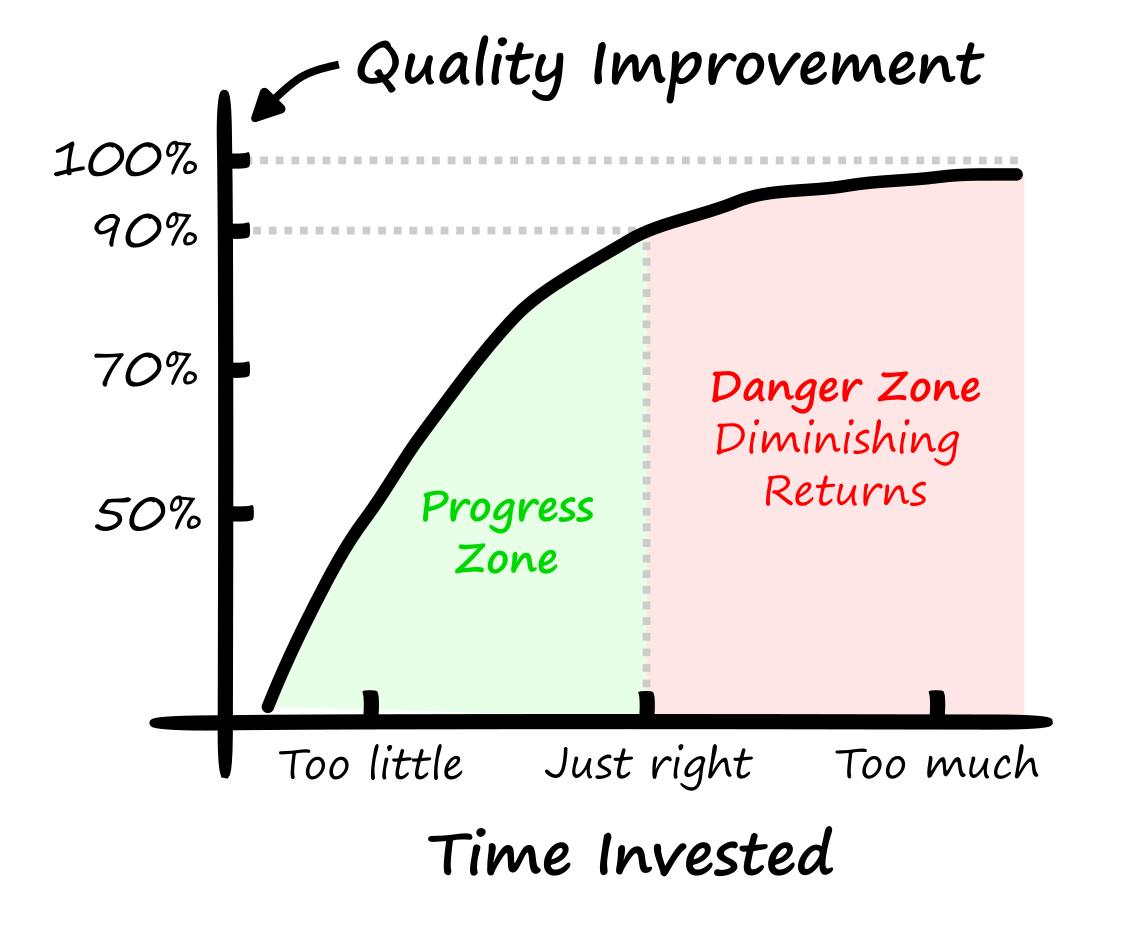The Perfection Trap: Why Done Beats Perfect

The weight of six years rested on my shoulders as I sat across from my Ph.D. advisor, surrounded by mountains of data, measurements, simulations, and revisions. My Ph.D. dissertation—my academic legacy—had to be flawless. When I asked for his final advice on achieving perfection, his response surprised me:
It doesn't have to be perfect—it has to be done.
His words shattered years of academic conditioning. I had always equated excellence with perfection, and this wisdom felt liberating and frightening.
The Hidden Cost of Endless Refinement
In our pursuit of excellence, we often overlook a fundamental principle: diminishing returns. This economic concept beautifully illustrates our perfectionism dilemma. Diminishing returns state that after a certain point, each additional hour spent refining yields less and less improvement. See figure below.

Applying this concept to my dissertation, after a point, each extra hour refining my work brings diminishing improvement. I needed to learn when to call it done.
The key is recognizing when further effort no longer adds real value. This is where the idea of "Done is Better than Perfect" becomes essential.
Done Is Better Than Perfect
As I entered the workplace from academia, I noticed that embracing "Done is Better than Perfect" prepared me for handling the demands of the industry. As a student, perfection had clear parameters—the correct answers, the proper conclusions from lab reports, and experiment results that validated theories. But professional life presented a different reality:
- Clarity and timeliness over exhaustive detail
- Engagement over comprehensive coverage
- Working solutions now over theoretical perfection later
In the professional world, results matter more than perfection. Efficiency, practicality, and deadlines shape success.
But my fellow perfectionists, do not worry. This mindset shift is not about lowering your standards. Instead, it's about recognizing that completion itself must be a key parameter in your pursuit of excellence.
If your work is not done, your impact is none.
The Architecture of Getting It Done
At first, it was scary to call something done when I knew there were still possible improvements. My breakthrough came when I realized that "done" doesn't happen by accident—it requires intentional design.
Preparation and planning made reaching a satisfying endpoint easier. Instead of jumping straight into projects, I began outlining my key ideas and structuring my work in advance.
This approach, which I discussed in my previous blog post, has helped me focus on the big picture. By starting with a clear plan, I ensure that my presentations, engineering projects, and technical writing are well-organized and purposeful from the beginning, making it easier to recognize when they are indeed "done."
The Momentum of Moving Forward
The most unexpected gift? The feeling of relief and excitement at the new creation. I still remember the wave of relief washing over me as I submitted my dissertation, followed by a refreshed sense of passion. The mental space cleared by completion allowed new ideas to flourish—ideas that would have remained dormant had I continued polishing indefinitely.
To conclude, the journey from perfectionism to purposeful completion isn't about lowering standards—it's about raising your impact. It's about recognizing that your contribution to the world comes not from one flawless creation, but from a body of meaningful work that evolves over time.
If you’re ready to break free from the perfection trap, the following section offers a few steps to help you get started.
Action Items
- Identify your current perfection trap: What project are you endlessly refining that needs to be declared complete?
- Create clear completion criteria: Define 1-3 elements that make this project "done enough."
- Set a non-negotiable deadline: Choose a date within the next two weeks to move this project from "in progress" to "complete."
- Reflect on the energy released: Notice what becomes possible once you've liberated yourself from endless refinement.
- Comment and share your process! Now, it’s your turn. Share with us how you escaped your perfection trap.




Comments ()